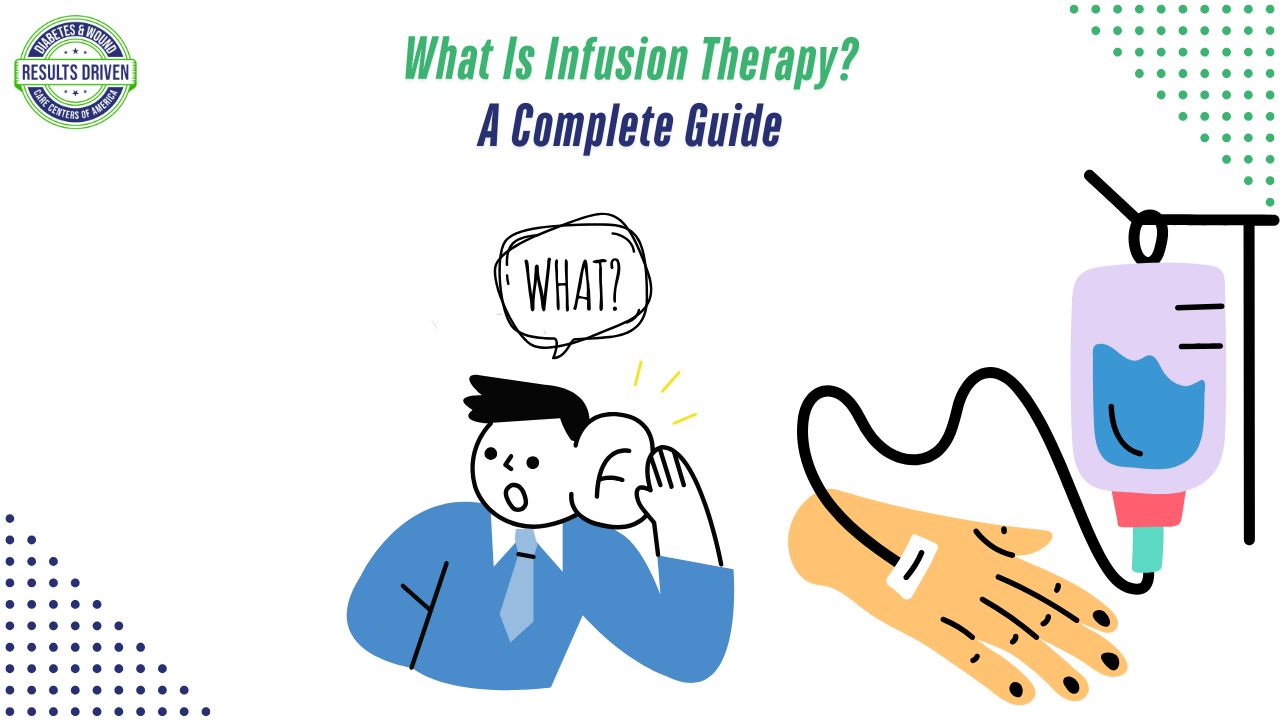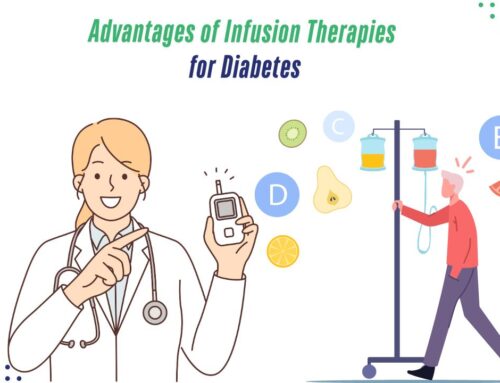What Is Infusion Therapy? A Complete Guide
Imagine receiving life-saving treatments or essential nutrients without taking any pills. How does that sound? For many patients, infusion therapy provides a transformative solution. This advanced medical technique allows medications, vitamins, or fluids to be delivered directly into the bloodstream, bypassing the digestive system for faster, more effective results. But what exactly is infusion therapy, and why has it become such an essential component of modern healthcare? Let’s explore everything you need to know about this groundbreaking treatment method.
Understanding Infusion Therapy
Infusion therapy is a medical treatment in which medications, nutrients, or fluids are administered directly into the bloodstream through a needle or catheter. Unlike oral medications that must pass through the digestive system before taking effect, infusion therapy allows for immediate absorption, making it an ideal option for patients requiring fast-acting or high-potency treatments. This therapy is particularly beneficial for individuals with chronic conditions, infections, or those who need precise and controlled dosing of medications.
One of the most common uses of infusion therapy is for chronic disease management. Conditions like Crohn’s disease, rheumatoid arthritis, and multiple sclerosis often require biologic medications that are best administered through infusion therapy. Patients with severe infections, such as sepsis or osteomyelitis, also benefit from intravenous antibiotics, which work more effectively when delivered directly into the bloodstream. Infusion therapy plays a significant role in cancer treatment, with many chemotherapy drugs requiring direct administration into the bloodstream for optimal effectiveness. It is also widely used for hydration and nutritional support, particularly for individuals suffering from severe dehydration, malnutrition, or gastrointestinal conditions that prevent nutrient absorption. Additionally, autoimmune disorders like lupus or psoriasis often require immunosuppressive treatments that are best delivered through infusion therapy.
How Infusion Therapy Works
The process of infusion therapy is carefully managed by healthcare professionals to ensure safe and effective treatment. A healthcare provider begins by inserting a needle or catheter into a vein, usually in the arm. Depending on the patient’s condition, longer-term access points such as central lines or ports may be used. Once the access is established, the prescribed medication, fluid, or nutrients are administered through a controlled drip or pump, allowing for steady absorption. The duration of therapy varies based on the treatment type, lasting anywhere from 30 minutes to several hours. Throughout the session, patients are closely monitored for any adverse reactions or complications to ensure safety and effectiveness.
Different types of infusion access points are used depending on the patient’s medical needs. A peripheral IV line, typically inserted into a smaller vein, is suitable for short-term treatments such as hydration or antibiotic therapy. A central venous catheter (CVC) is inserted into a larger vein and is often used for long-term or high-volume therapies like chemotherapy. Some patients require implantable ports, which are small devices placed under the skin, providing convenient access for repeated treatments without the need for frequent needle insertions.
Infusion Therapy Process
The process of infusion therapy is carefully managed by healthcare professionals to ensure safe and effective treatment. Here’s what to expect during a typical infusion session:
Preparation and Access Placement – A healthcare provider inserts a needle or catheter into a vein, usually in the arm. In some cases, longer-term access points such as central lines or ports may be used.
Medication Delivery – The prescribed medication, fluid, or nutrients are administered through a controlled drip or pump, allowing for steady absorption.
Monitoring and Adjustment – Throughout the infusion, the patient is closely monitored for any adverse reactions or complications. Depending on the treatment, the process may last anywhere from 30 minutes to several hours.
Types of Infusion Therapy Access
The method of infusion therapy varies based on the patient’s condition and treatment requirements. Common types of access points include:
Peripheral IV Line: Inserted into a smaller vein, typically used for short-term treatments such as hydration or antibiotic therapy.
Central Venous Catheter (CVC): Inserted into a larger vein, often used for long-term or high-volume therapies like chemotherapy.
Implantable Ports: Small devices placed under the skin for repeated treatments, providing easier and more convenient access for ongoing therapies.
Benefits of Infusion Therapy
Infusion therapy offers numerous advantages over traditional medication administration methods. Some of the key benefits include:
Rapid Absorption: By delivering medication directly into the bloodstream, infusion therapy allows for immediate and effective treatment, making it ideal for urgent conditions.
Precision Dosing: Infusion therapy ensures that medications reach their target at the right concentration, minimizing the risk of under- or overdosing.
Versatility: This therapy is highly adaptable and can be used for a wide range of medical conditions, from hydration therapy to complex chemotherapy regimens.
Improved Quality of Life: With the availability of home infusion services, many patients can receive treatment without frequent hospital visits, making long-term care more convenient.
Infusion therapy offers numerous advantages over traditional medication administration methods. One of the most significant benefits is rapid absorption. Because the medication or nutrients are delivered directly into the bloodstream, they bypass the digestive system, allowing for immediate and effective treatment. This makes infusion therapy ideal for urgent conditions that require quick intervention.
Another advantage is precision dosing. Infusion therapy ensures that medications reach their target at the right concentration, minimizing the risk of under- or overdosing. This level of accuracy is particularly important for patients with chronic illnesses who require consistent, controlled medication levels.
The versatility of infusion therapy makes it a valuable tool in modern medicine. It is used for a wide range of conditions, from simple hydration therapy to complex chemotherapy regimens. In many cases, home infusion services allow patients to receive treatment in a comfortable and familiar setting, reducing the need for frequent hospital visits and improving their overall quality of life.
Who Can Benefit from Infusion Therapy?
Infusion therapy is an essential treatment option for individuals who:
- Have infections that do not respond to oral antibiotics.
- Require continuous medication for chronic illnesses.
- Experience severe dehydration or malnutrition that requires intravenous fluids.
- Have autoimmune disorders requiring biological treatments.
- Need chemotherapy or immunotherapy for cancer treatment.
Infusion therapy is an essential treatment option for individuals who have infections that do not respond to oral antibiotics, require continuous medication for chronic illnesses, or experience severe dehydration or malnutrition that necessitates intravenous fluids. Patients with autoimmune disorders who require biological treatments, as well as those undergoing chemotherapy or immunotherapy for cancer, also benefit significantly from infusion therapy.
For many of these individuals, oral medications are either ineffective or not well tolerated. Infusion therapy provides an alternative that delivers medication more efficiently and effectively, ensuring better health outcomes.
Common Uses of Infusion Therapy
Infusion therapy is widely used across various medical fields. Some of the most common applications include:
Chronic Disease Management: Conditions like Crohn’s disease, rheumatoid arthritis, and multiple sclerosis often require biologic medications that are best administered through infusion therapy.
Severe Infections: Patients with conditions like sepsis or osteomyelitis may require intravenous antibiotics that work more effectively when delivered directly into the bloodstream.
Cancer Treatment: Many chemotherapy drugs must be administered through infusion therapy to ensure proper absorption and effectiveness.
Hydration and Nutritional Support: Patients suffering from severe dehydration, malnutrition, or gastrointestinal conditions that prevent nutrient absorption may benefit from intravenous fluids or nutritional infusions.
Autoimmune Disorders: Infusion therapy is commonly used for immunosuppressive treatments in patients with lupus, psoriasis, or other autoimmune conditions.
Risks and Considerations
While infusion therapy is generally safe, it does carry some potential risks. Proper medical supervision is crucial to minimize complications. Some of the most common risks include:
Infections: Any time a catheter is placed into a vein, there is a risk of infection. Proper sterilization and catheter care are essential to prevent complications.
Vein Irritation: Prolonged therapy may cause irritation or inflammation in the veins, sometimes requiring alternative access points.
Allergic Reactions: Some patients may have an allergic reaction to the medication being infused, which is why close monitoring during the session is important.
While infusion therapy is generally safe, it does carry some potential risks. The most common risk is infection, as any time a catheter is placed into a vein, there is a chance of bacteria entering the bloodstream. Proper sterilization and catheter care are essential to prevent complications.
Prolonged therapy may also cause irritation or inflammation in the veins, sometimes requiring alternative access points. In some cases, patients may experience allergic reactions to the medication being infused, which is why close monitoring during the session is important. Healthcare providers carefully assess each patient’s condition before recommending infusion therapy and take precautions to reduce these risks.
Healthcare providers carefully assess each patient’s condition before recommending infusion therapy and take precautions to reduce these risks.
The Future of Infusion Therapy
Infusion therapy continues to evolve with advances in medical technology. New developments in precision medicine, drug formulations, and infusion delivery methods are making this treatment even more effective and accessible. Home infusion therapy is gaining popularity, allowing patients to receive treatments without the inconvenience of frequent hospital visits.
Researchers are also exploring innovative techniques such as smart infusion pumps, which automatically adjust medication dosages based on real-time patient data. These advancements are shaping the future of healthcare, ensuring that infusion therapy remains a vital tool for treating complex medical conditions.
A Transformative Approach to Treatment
Infusion therapy has revolutionized the way essential medications and treatments are delivered, offering hope and improved outcomes for countless patients. Whether managing chronic illnesses, fighting infections, or undergoing chemotherapy, this advanced treatment method provides an efficient, precise, and convenient way to receive care.
If you or a loved one could benefit from infusion therapy, consulting with a healthcare provider is the first step in exploring this powerful treatment option. With the right approach, infusion therapy can help restore health, enhance well-being, and improve quality of life.







